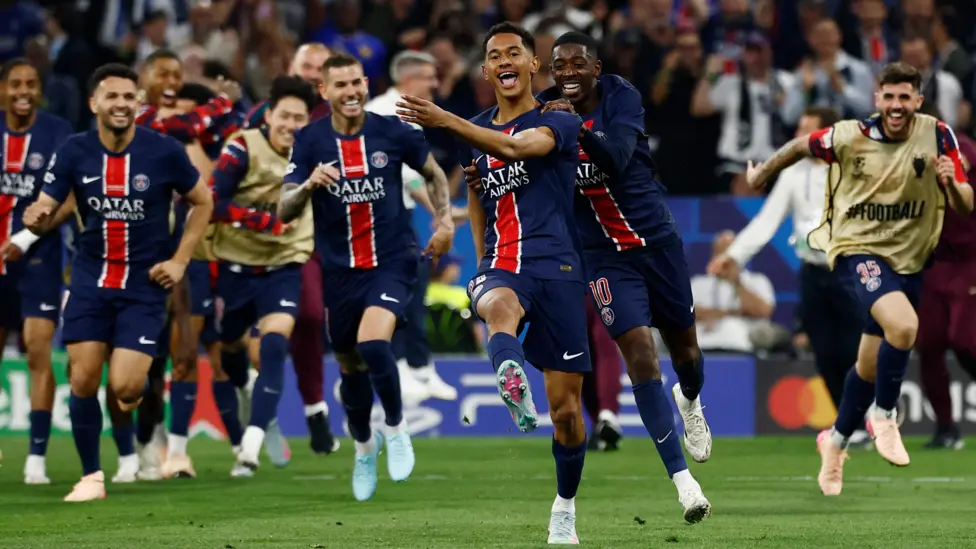Paris Saint-Germain’s evolution from a star-studded “bling-bling” project into a club increasingly defined by homegrown talent has become one of the most remarkable shifts in European football. Once known for blockbuster signings and global superstars, PSG are now leaning heavily on their Paris-born academy products to defend their Champions League crown—an approach accelerated by injuries but rooted in long-term planning.
This transformation was highlighted again this season as as many as five academy graduates featured regularly in the senior team. When injuries sidelined Ousmane Dembélé, Désiré Doué and Achraf Hakimi, PSG turned naturally to local youngsters such as Senny Mayulu, Warren Zaïre-Emery, Quentin Ndjantou, Ibrahim Mbaye and Mathis Jangeal. All were developed in the Paris region, a talent hotbed that has supplied stars to Europe for decades—many of whom previously slipped through PSG’s hands.
For years, players like Kingsley Coman, Mike Maignan and Moussa Diaby left Paris before making senior breakthroughs, with the club looking abroad instead of within. But according to PSG sporting advisor Luis Campos, that era is officially over. “More and more players from the Paris area will be involved in the first team,” Campos said at the academy’s 50th-anniversary celebration. The club, he emphasized, wants to build “step by step,” allowing young prospects to climb through age groups toward the senior squad.
The shift aligns with PSG’s investment in the ultra-modern PSG Campus, their 59-hectare training centre inaugurated last year. The complex, replacing the historic Camp des Loges, includes 16 pitches, player housing for 140 youths, study facilities and even sustainable features like a vegetable garden. The first team trains at the top of a four-level structure, with academy teams arranged below—a literal pathway reflecting the club’s new philosophy.
Crucially, PSG also want less dependence on the transfer market. “Going to the supermarket often doesn’t make you a better cook,” Campos joked, reaffirming that stockpiling stars is no longer the club’s approach. Instead, they aim for coherence in the playing style, from the youth teams to Luis Enrique’s first team.
Luis Enrique’s arrival two years ago was pivotal. Known for trusting young players, the Spanish coach met immediately with academy staff to outline his principles: intensity, bravery and technical confidence. Rather than dictating rigid formations, he encouraged a unified philosophy, fostering an environment where young talents could adapt quickly when called upon.
Few embody this shift better than 19-year-old Senny Mayulu. Once an injury-prone prospect, Mayulu has now passed 50 senior appearances and become a key figure across multiple positions—from right-back to central midfield to centre-forward. His goal in the Champions League final against Inter cemented his place in PSG’s new identity, while his winner against Barcelona earlier this season showcased his maturity under pressure.
Warren Zaïre-Emery, meanwhile, has grown into one of Europe’s most complete young players. The 19-year-old, already a France international, now captains PSG during their injury-ridden spell and has rediscovered his top form after struggles last season. Director of the academy Yohan Cabaye praises his mentality but warns he is a rare case: “We can’t use him as an example—otherwise we’d have 20 16-year-olds knocking on Luis Enrique’s door.”
PSG’s new priority is also defensive: keeping Parisian talent in Paris. With full-time scouts monitoring every corner of Île-de-France—the world’s most fertile footballing region—the club aims to stop losing future stars to domestic rivals and European giants.
Youth championship success suggests PSG’s pipeline is strong, and with first-team opportunities clearer than ever, the next generation may not feel the need to leave. The club’s European title last season proved that youthful energy can blend with experience to deliver success.
Now, as injuries force PSG to accelerate their youth revolution, the European champions find themselves not weakened but rejuvenated—powered by the very talent that grows in their own backyard.



